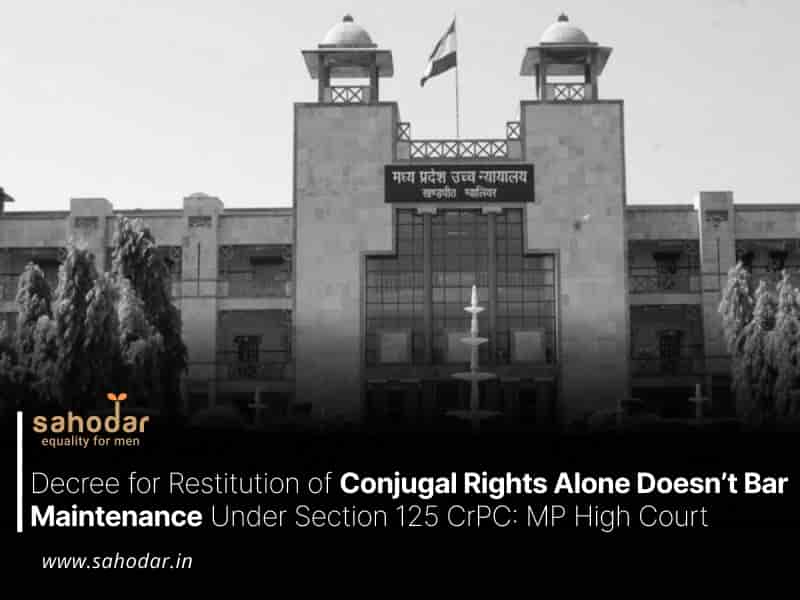The Madhya Pradesh High Court has reaffirmed that a decree for restitution under Section 9 of the Hindu Marriage Act, 1955 (HMA), does not preclude the award of maintenance under Section 125 of the Criminal Procedure Code (CrPC).
The Indore Bench addressed a Criminal Revision petition filed under Section 19(4) of the Family Courts Act, 1984, and Section 397 CrPC, challenging a Family Court order granting maintenance of ₹6,000 to the wife.
Justice Prem Narayan Singh, presiding as a single bench, referenced the Delhi High Court’s judgment in Babita vs. Munna Lal [2022 SCC Online Del 4933], which highlighted that…
“MERE DECREE OF SECTION 9 HMA DOES NOT DISENTITLE GRANT OF MAINTENANCE UNDER SECTION 125 Cr. P.C. … There is nothing in law to debar grant of maintenance under Section 125 Cr. P.C. in case a decree of restitution of conjugal rights is possessed by the husband. … There is no express bar to grant maintenance to a wife, against whom a decree for restitution of conjugal rights under Section 9 of the Hindu Marriage Act has been passed. There is, therefore, no bar to entertain application for grant of maintenance.”
Advocate Swati Sharma represented the petitioner, while Advocate Gopal Singh Bhadoria appeared on behalf of the respondents.
Factual Background:
The petitioner (husband) and the respondent (wife) were married in 2010 through mutual consent. The husband was an educated but unemployed individual, a fact the wife was fully aware of at the time of marriage. The wife, a B-Tech graduate, pursued her M-Tech studies after marriage with the financial support of her in-laws. The couple had a daughter, and their marriage remained harmonious for the first eight years. However, over time, the wife began frequently visiting Ujjain. The husband noticed that these visits gradually became longer, and he observed a significant decline in his wife’s interest in fulfilling her conjugal duties.
Subsequently, the wife requested the husband to relocate to Ujjain. Despite multiple efforts to explain that he could not leave his elderly, dependent parents, the husband was unable to convince her. He also made several attempts to bring her back to Khandwa, but these efforts were unsuccessful. As a result, he filed an application for restitution of conjugal rights before the Family Court, which was granted in his favor. In response, the wife filed an application under Section 125 CrPC for maintenance, which was also allowed by the Family Court. Consequently, the matter was brought before the High Court for consideration.
The High Court in the above regard, said, “On this aspect, considering the almost similar facts and circumstances of the case, the Co-ordinate Bench of this Court (Jabalpur Bench) in the case of Avedesh Kumar Tiwari vs. Smt. Chitra Tiwari passed in CRR No.1447/2011 dated 28.08.2015 has clearly held that “when the applicant did not lead any evidence before the trial Court and ex-parte order of maintenance was granted then, the evidence lead in the case under Section 9 of the Hindu Marriage Act cannot be applied in the maintenance case with retrospective effect.”
The Court further noted that the conclusions reached in the final decree proceedings under Section 9 of the Hindu Marriage Act (HMA) do not have a binding effect on the Trial Court or Family Court when deciding on the grant or denial of maintenance under Section 125 of the CrPC.
“In view of the aforesaid settled law, only on the basis of decree in favour of petitioner under Section 9 of HMA, it cannot be assumed that the husband is willing to keep his wife with him. Actually, behaviour of husband with his wife is material in such type of cases. Even if husband obtained a decree under Section 9 of HMA in his favour, it would be expected from him that he must behave properly with his wife and keep her with him in good manner”, it remarked.
The Court also observed that if a husband engages in misconduct or subjects his wife to cruelty, she has valid grounds to live separately. Moreover, an ex-parte decree alone cannot disqualify a destitute wife from claiming maintenance from her husband.
“It is time honourned principal that the wife is entitled to have a financial status equivalent to that of the husband. In this Case, the respondent has proved that she is unable to maintain herself. Certainly, she would get only the maintenance amount from her husband which is neither luxurious nor penurious but in any way, it should be in accordance with financial status of husband. The expression “unable to maintain herself” does not mean that the wife must be absolutely destitute before she can apply for maintenance under Section 125 Cr.P.C.”, it concluded.
Consequently, the High Court rejected the petition and upheld the contested order.

